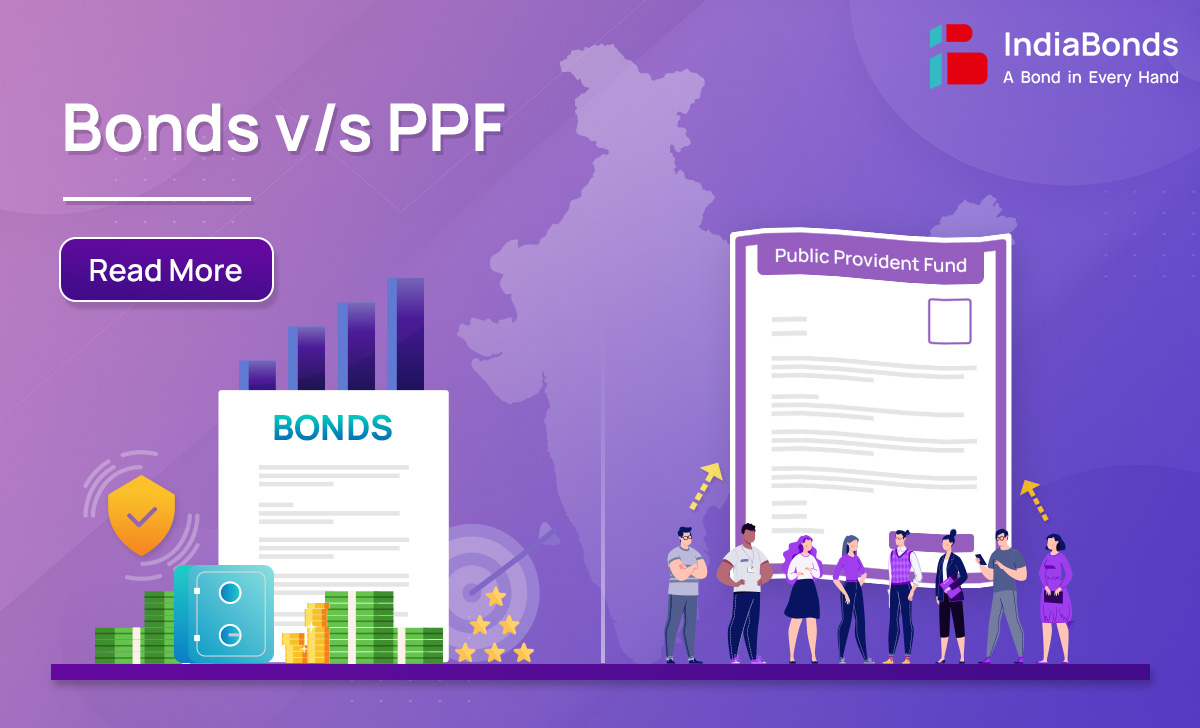Bonds v/s PPF

Anyone who seeks to invest wants to do so to maximise their profit. Banks and financial corporations offer fixed-income instruments that offer a guaranteed rate of return on your investment.
For instance, if you save Rs. 100 and the avenue offers a 7% return, you will earn Rs. 7 in interest income.
There are different types of fixed-income instruments that are available in the market. Bonds and Public Provident Fund (PPF) are two such instruments that are quite popular among investors.
While both avenues offer assured returns, they are pretty different. Let’s understand the concept of bonds and the Public Provident Fund and see how they differ.
What are Bonds?
When the government or a company needs funds, it can borrow from the public by issuing bonds. This is how bonds are created.
When you invest in these bonds, you loan the fund to the government or the company that issued them.
In exchange for your loan, the issuing entity offers a fixed rate of return on the bond. This is called the coupon.
For instance, say, you invest in Rs. 10,000 bonds offering 7% returns annually with a term of five years.
Upon the lapse of the term, you will get Rs. 700 on your investment every year for five years. When the bond matures, your investment of Rs. 10,000 will be refunded.
Different types of bonds are available in the market, and most can be traded on the stock exchange for liquidity.
What is PPF?
PPF stands for “Public Provident Fund.” It is also a fixed-income instrument backed by the government.
PPF is a long-term saving scheme that helps you save taxes on the amount invested and the returns earned.
You can open a PPF account with a bank or a post office. The minimum deposit amount is Rs.500, while the maximum is Rs. 1.5 Lakhs. The deposit tenure is 15 years; you can extend the term in blocks of 5 years.
Under the PPF account, once you open the account, you must make the minimum deposit every year to keep the account active.
Thus, the Public Provident Fund allows you to save regularly and create a secured corpus for your financial goals.
The government determines the interest rate on PPF deposits. The government also reviews the rates every quarter and might change them if needed.
Currently, the PPF account interest rate is 7.1% for Quarter 1 (Jan – Mar 2023) per annum, compounded annually.




Difference Between Bonds and PPF
Here are the primary differences between bonds and PPF:
| Points of difference | Bonds | Public Provident Fund Scheme |
| Meaning | Debt instruments issued by the government or companies to raise funds. | A fixed-income deposit scheme backed by the Government. |
| Investment risk | Bonds might carry a credit risk if the issuer defaults on repayment. That is why the credit rating of bonds should be checked. | There is no risk since the PPF account is backed by the government. |
| Deposit amount | It depends on the value of the bond | Minimum – Rs.500 Maximum – Rs.1.5 lakhs |
| Deposit frequency | One time | Annual |
| Interest rate | Determined by the issuer. Once fixed, it does not change during the bond’s tenure. | Determined by the government. The Public Provident Fund interest rate is reviewed quarterly and can change during the deposit tenure. |
| Types | There are different types of bonds like corporate bonds, zero coupon bonds, government bonds, sovereign gold bonds, etc. | There is only one type of PPF account. |
| Tenure | It depends on the bond that you choose. | 15 years. It can be extended further in blocks of 5 years. |
| Eligibility | Any Indian citizens can invest in as many bonds as required. | Only resident Indians can invest in a PPF account. One account per person is allowed. |
| Liquidity | Bonds can be traded on the exchange. | It cannot be traded. The deposit is fixed for 15 years. |
| Tax benefits | Bonds are taxable as well as Tax – Free. | Invested amount is tax-free under Section 80C. Interest earned, and the maturity amount are also fully tax-free. |
Final Words
While both bonds and the Public Provident Fund scheme are fixed-income instruments, they are quite different. Some corporate bonds might also offer higher returns than a PPF account. So, understand what bonds and PPF are and how they differ.
If you are wondering if PPF is a good investment, consider your needs: if you want risk-free investment for a long-term period, a PPF scheme can be a suitable choice.
Alternatively, if you want higher returns and the flexibility to liquidate your investment when needed, you can opt for bonds. It is fairly simple to invest in bonds online on IndiaBonds platform where you can choose category and amounts for investment and even pay online. So, assess your financial goals, risk appetite and investment preferences and then choose between the two. You can also choose both if they align with your financial plan.
FAQs
1. How to invest in bonds?
You can invest in bonds if you have a Demat and a trading account. Simply signup on IndiaBonds.com, complete your KYC online in minutes and browse through 1000s of bonds online. Choose the bond of your choice and invest in minutes. To read detailed steps, read our blog on how to invest in bonds online.
2. How to invest in PPF?
You can invest in a PPF account through a bank or a post office.
3. What is the tax implication on the interest earned from bonds?
The interest earned from bonds is categorised under ‘Income from other sources and taxed at your slab rates.
Disclaimer: Investments in debt securities/ municipal debt securities/ securitised debt instruments are subject to risks including delay and/ or default in payment. Read all the offer related documents carefully.













































